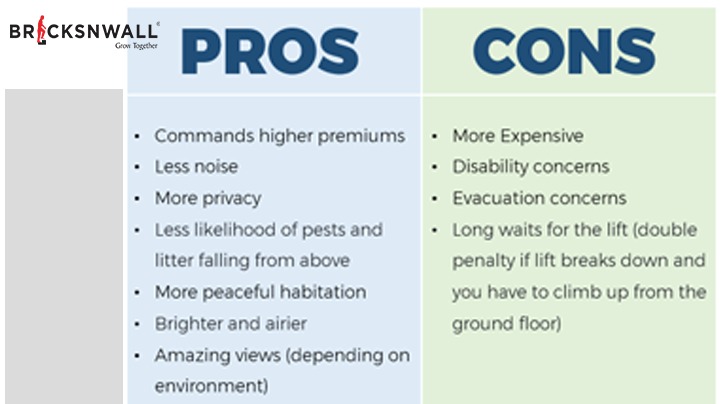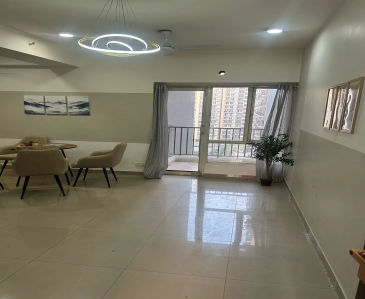The benefits and drawbacks of living on the lower and upper floors
Bricksnwall Trusted Experts

These days, purchasers are more concerned with
things than just connectivity, facilities, and social infrastructure. Another an important decision is whether to live on a lower or higher floor. So, which
would you prefer—living nearer to the ground or closer to the clouds? What
benefits come with living on a higher floor as opposed to a lower one?
A thorough analysis of the available possibilities
is essential when purchasing an apartment. To
do this, it is necessary to comprehend the subtleties associated with
purchasing a home. While choosing between living on a lower floor or a higher
floor is an option for purchasers, consider the benefits and drawbacks of each.
To make a wise choice, set aside your preconceptions and examine the practical
details.
Higher-floor apartments
Buildings with five stories or fewer are typically
regarded as low-rises in India; hence, the floors above the fifth are the
higher levels, up to the terrace.
Higher-floor living
benefits
- Higher
floors are less likely to experience a break-in or insect assault. Living
vertically reduces noise pollution, which is a regular occurrence in urban
areas.
- Because
hot air rises to higher stories, lower winter heating expenditures are
achieved.
- Additionally,
the balcony views are excellent from these stories.
- Some
buildings allow the owner of the top floor to have unrestricted access to
the roof, which gives the occupants the opportunity to garden.
- Because
the top floors receive more sunlight, there is less need for artificial
lighting.
- A
higher floor has less dust exposure, which reduces air pollution.
Living on a higher floor has drawbacks.
- In
upper floors, moving furniture, bags, or new objects might be quite
difficult.
- Summertime
means higher electricity bills because more daylight hours are spent
outside.
- Living
on upper floors can be concerning in the event of a fire or earthquake
since lifts might not be operational.
- Families
with senior relatives are not advised to reside on higher floors. If the
lifts were not working, they would have to use the stairs, which would be
a difficult chore.
Living on the lower floor
Lower-floor living, which has historically been
favored by buyers, has significantly declined as a result of growing pollution,
an increase in the number of tall buildings, and growing security concerns.
Benefits of living on a lower floor
- Residents
on the ground floor have easier access to the clubhouse, parks, and
swimming pools, among other communal areas.
- The
lower floors make it easy to move large objects.
- During
the summer, lower-floor apartments stay cooler, which lowers the
electricity expenditure.
- Lower-level
apartments, particularly those on the ground floor, frequently have
gardens or backyards. This draws a lot of purchasers.
- Senior
citizens are better suited for lower floors.
Living on a lower floor has drawbacks.
- The
likelihood of bugs, insects, and burglaries is higher on lower floors.
- In
addition, excessive noise levels may be upsetting if the residence is
close to a busy road.
- Winter
heating bills for flats on lower floors may be greater because they
typically remain colder.
- Residents
frequently lament the lack of privacy on these floors since they have less
access to natural light during the day and must rely on artificial
lighting, which can increase their utility costs.
Things to look at when deciding between living on a
lower floor or a higher floor
Depending on what purchasers are searching for,
there are different groups of buyers on both lower and upper levels.
However, before making a final choice, take into account the following
factors.
Higher Floors
- Examine
the fire fighting apparatus's quality and sufficiency, as well as the
frequency of fire extinguisher replacements.
- Verify
that there is enough power backup in the building to keep the elevators
operating.
- Look
for any potential seepage during the wet season.
Lower floors
- Verify
the flat on the lower floor's security and safety.
- Make
sure there isn't excessive noise in the community or culture.
- Determine
the property's prospective investment and resale value.
Both lower-floor and higher-floor living have advantages and disadvantages, as the discussion above makes clear. Thus, consider amenities like accessibility, noise tolerance, personal taste, and privacy requirements before selecting any floor level. Because each person's living situation is unique, weigh the benefits and drawbacks in light of your own needs and circumstances.




